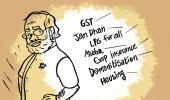Farmers should be encouraged into crops needing less of water, while ensuring a market for what they sow, said ICAR’s head.

In a year, the Indian Council of Agricultural Research (ICAR) will prepare a plan specifying the maximum sowing area for each crop.
It will take account of demand and supply, ecology and water availability in an area.
Also ensuring that while the acreage under high-water consuming crops such as rice and sugarcane goes down, the country’s food security is not hit adversely.
“We cannot sacrifice the country’s food security for the sake of crop diversification,” said Trilochan Mohapatra, head of ICAR and secretary of the government’s department of agricultural research and education.
Farmers should be encouraged into crops needing less of water, while ensuring a market for what they sow, he said.
His personal opinion is that water consumed for irrigation should be metered.
ICAR estimates 2,000 to 5,000 litres of water is needed to produce a kilo of rice.
For every kg of sugarcane, around 2,000 litres. While, pulses or oilseed needs 500-600 litres a kilo.
In India, over 80 per cent of water is used in irrigation.
Of the net sown area of around 140 million hectares (mn ha), close to half (68.4 mn ha) is irrigated.
The rest is rain-fed. Within the latter, only nine mn ha is under drip and sprinkler irrigation which consumes 35-40 per cent less water than the conventional method of ‘flood irrigation’ (where water is left open from tubewells on to the field).
“In the next few years, we have targeted to double-raise the area under micro irrigation, for which several strategies are being worked out,” Mohapatra said.
To ensure farmers consume less water, he said, ICAR and sister agencies are working on a three-pronged strategy.
Comprising installing of sensors in tubewells to regulate supply, encouraging farmers to use different sources and not only groundwater, plus recycling of waste water through specially developed plant varieties.
Photograph: Jayanta Dey/Reuters












 © 2025
© 2025